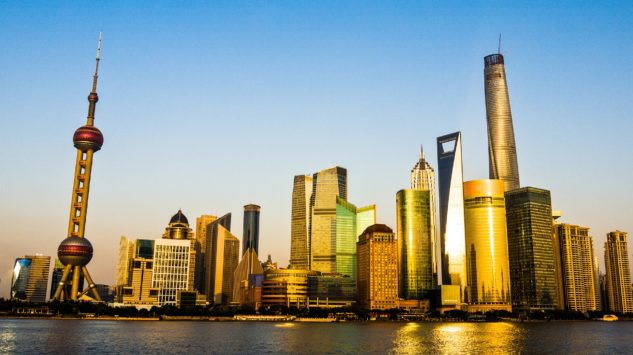Issue Briefs

Davos and China offer the same grim destinyMartin HutchinsonJuly 16th, 2021 |
||
| The World Economic Forum, sponsor of the annual Davos meeting, proposes a “Great Reset” of the capitalist system. The People’s Republic of China nominally adheres to the Communism of its founder, Chairman Mao Ze-dong. Yet in practice, the societies each advocates bear a remarkable similarity to each other and share two overriding characteristics: they are not regimes under which any free man or woman would want to live, and their prescriptions will lead to increasing poverty in the long term.
China followed the Asian Tigers model I do not often agree with the Financial Times’ Gideon Rachman, but he recently offered a perceptive analysis of China’s path since the death of Mao in 1976. Initially, under Deng Xiaoping, in control of its destiny until his death in 1997, China followed fairly closely the East Asian path to riches pursued by Japan in the 1950s and 1960s, and South Korea, Taiwan and other East Asian “Tigers” subsequently. There was a considerable amount of state control, but it mostly pushed in a direction that a free market would have followed. All the economies concentrated fiercely on exports of manufactured goods to wealthy Western markets and used their labor cost advantages and extremely high savings rates to produce rapid growth and gradually improving living standards for their people. The East Asian countries were all our allies in the Cold War, so the U.S. and its Western allies did not react with protectionism to their rapidly increasing market share. As they grew richer, they moved towards true democracy, but kept their economic model of “steered capitalism” more or less intact – even today, there is more coordination of business activities with national goals than is normal in the United States. Give China the benefit of the doubt When China began its rapid growth in the 1990s, despite the signs (Tiananmen Square massacres, June 1989) that the regime was not liberalizing, it was given the benefit of the doubt in the euphoric haze that followed the fall of the Berlin Wall. It was allowed to join the World Trade Organization and received top-level trade privileges in 2001. China’s model began to deviate from that of its East Asian neighbors around 2002, with the advent of Hu Jintao as General Secretary of the Party. From that point on, China began to seek dominance in emerging markets, providing infrastructure and tying up control of sectors of the recipient economy – for example it bought strategic stakes in several Zambian copper mines in 2007, well before the official launch of its “Belt and Road” initiative in 2014. China secured control of the world’s “rare earths” production over the two decades to 2010. It has since secured control over most of the world’s lithium production, a key ingredient in the batteries of electric vehicles, transition to which is a major if ill-considered Western commitment. We are told that from next year, it will control four of the world’s five largest producers of polysilicon, the essential basis for solar panels, yet another product that the world’s wokes are forcing us to buy. China did not become a democratic market economy As is now well known, the vision we were sold in the 1990s of 1.4 billion Chinese people transitioning peacefully to prosperity and freedom, was a load of codswallop, even at the time, and has become more so since. Much of Chinese industry relies on forced labor, for example the polysilicon producers of Xinjiang. China’s leading entrepreneurs are agents of the state, and when an outsider like Jack Ma of Alibaba achieves success, he is quietly “persuaded” not to rock the boat. China’s major companies are increasingly dragooned into the service of its central planning, while its output statistics are almost entirely fictional. Freedom of speech does not exist, and social media serves to report users to China’s “social credit system” which hands out privileges and more often penalties according to the status of the social media user. Presumably if, like me, you refused to use social media in any form, you would be assigned a social credit score of zero and banned from using the local bus system. “Great Reset” proposed by the World Economic Forum Now let us consider the “Great Reset.” As propounded by the World Economic Forum, WEF, the pandemic appears to offer a splendid opportunity to remake the Western economy, forcing it by government diktat into a form more tolerable to the wokes at the WEF. We are to be dragooned into electric vehicles, for example, not merely by subsidies but, if necessary, by coercion. Similarly, the program as applied even in “Conservative”-ruled Britain will force millions of non-affluent citizens to spend some $15,000 replacing their heating systems with new heat pumps that will not operate properly on very cold days. The effect on the electric power grid of these two changes alone will be to overload it, especially as efficient gas-fired power stations will be closed and replaced with highly inefficient and only intermittently available solar and wind power stations. Think of the frequently occurring cold days in an English winter when there is impenetrable cloud cover, a flat calm and freezing temperatures, and you will realize than many elderly British citizens are due to succumb to hypothermia in the winters ahead – presumably the savings for the pension system from their disappearance will help to pay for all this. The role of social media As for the Chinese-style “social credit system” we are already close to it. The western social media and tech companies are close to monopolies and have shown no hesitation in banning speech of those, even Presidents, whose speech opposes the woke narrative. If governments do not strike back with vigorous antitrust prosecutions, the leftist monopolies will become bolder. They already collect huge amounts of information on people, from the various gadgets they have infiltrated into our lives. With all this information, it will be easy enough to create a “social credit system”, with no-fly lists and the like. Those with disfavored opinions will then find their lives remarkably restricted, although only a few of them will end up in concentration camps. President Putin scandalized the Western media by asking President Biden why he is holding so many January 6 demonstrators without trial. It is a good question, that may come to be applied to more beyond those few unlucky souls in the years ahead. Chinese style subjugation The most depressing thing about the WEF’s takeover of our lives, to push us towards Chinese levels of subjugation, is that there appears no way out of it. This is very dangerous. It means that further encroachments on our liberties, economic and personal can be carried out more or less without check, at the whim of our rulers. All the major Western governments have signed on to this nonsense, including Boris Johnson’s Conservatives, who might be expected to resist it, at least feebly. Only Vladimir Putin resists, and his regime is a poor bastion of freedom, to put it mildly. With such global consensus, global agreements to oppress ordinary people are far too easily reached. In such a future, Chinese serfdom awaits us. China’s unworkable model In the long term however, the sheer inefficiency of this tyranny may well defeat it. However good it is at producing tailor-made viruses (my mind is open on whether it did so this time), China is incapable of producing a workable vaccine against its own virus. (The much less economically powerful Russia, still full of good scientists, appears to have produced a perfectly functional one). China’s economic statistics are fiction, and the growth rates it trumpets are equally so, probably becoming more fictional as China deviates further from the free-market model. As an East Asian “Tiger” it moved rapidly into the modern world; as a Soviet-style attempted hegemon, it is likely to regress, as did the Soviet Union. Should this happen, any Chinese global dominance will be short-lived. WEF consensus will not last As for the WEF, its economic dominance is also likely to be short-lived. First, its statist model is little better than China’s, and so will fall more and more obviously short of what the Western population has come to expect. This will produce 2016-style revulsions among the populace, which we can hope will be successful in at least some cases, ending the loathsome consensus. Second, and more subtly, the woke consensus is strongest in the elite colleges. The admissions departments in those universities are abandoning objective indices of merit, preferring to select their students according to their ethnic background and apparent agreement with the woke consensus. However, a “meritocracy” in which the gatekeeper elite institutions have stopped selecting on merit breaks down pretty quickly once the dozy woke Ivy League graduates reach the workforce and prove to be utterly useless to any sane employer. With such people promoted far beyond their merit, company after company will crash and burn, and the intelligent Ivy League rejects, fresh from welding school, will once again take over the system – much to its and everybody else’s benefit. Unlike many of the other dooms I predicted, this one should thus be self-correcting in the long run. Thank God! This article was originally published on the True Blue Will Never Stain http://www.tbwns.com The views and opinions expressed in this issue brief are those of the author.
|
